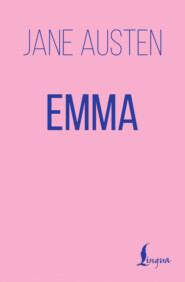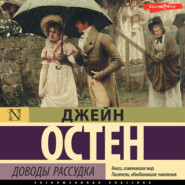По всем вопросам обращайтесь на: info@litportal.ru
(©) 2003-2025.
✖
Pride and Prejudice. Адаптированная книга для чтения на английском языке. Intermediate
Настройки чтения
Размер шрифта
Высота строк
Поля
«Nothing is more deceptive», said Darcy, «than the appearance of modesty. It is often just carelessness and sometimes an indirect boast».
«And which of the two do you call my little recent piece of modesty?»
«The indirect boast. You are really proud of your defects in writing, because you believe them to be the result from rapidity of thought, and you think it's highly interesting. And when you told Mrs. Bennet this morning that if you ever decided to leave Netherfield you'd be gone in five minutes, you meant it to be a sort of compliment to yourself. But what is there so very praiseworthy in haste which must leave very necessary business undone, and can be of no real advantage to yourself or anyone else?»
«No», cried Bingley, «this is too much, to remember at night all the foolish things that were said in the morning. And yet, upon my honour, I believe what I said of myself to be true, and I believe it at this moment. At least, therefore, I did not pretend to the character of needless haste merely to show off before the ladies».
«I know you believe it; but lam by no means convinced that you would be gone so fast if, as you were mounting your horse, a friend were to say, „Bingley, you had better stay till next week“, you would probably do it, you would probably not go».
«By this», cried Elizabeth, «you have only shown Mr. Bingley's good nature much better than he did himself».
«Thank you», said Bingley, «for turning my friend's words into a compliment on the sweetness of my temper. But I am convinced he would certainly be of better opinion of me, if under such circumstance I refused to stay and rode off as fast as I could».
«Would Mr. Darcy then consider that your refusal to stay was justified by the sudden decision to go away?»
«Upon my word, I cannot exactly explain the matter; Darcy must speak for himself».
Darcy said he didn't have to explain the opinion he hadn't expressed.
«But you must remember, Miss Bennet, that the friend just asked him to return to the house, without offering any argument in favour of its necessity».
«To yield readily, easily, to the persuasion of a friend is no virtue with you».
«To yield without persuasion is no compliment to the intelligence of either».
«It seems, Mr. Darcy, you allow nothing for the influence of friendship and affection. Would you think poorly of a person if he yields to the desire of a friend, without waiting to be persuaded?»
«Before we continue, won't it be better, if we determine the degree of importance of that friend's request more precisely, as well as the degree of intimacy between the parties?»
«By all means», cried Bingley, «let us hear all the details, not forgetting their comparative height and size. I assure you, Miss Bennet, if Darcy were not such a great tall fellow, in comparison with myself, I would not yield to him half so much. I must say I don't know a more awful object than Darcy, on certain occasions, and in certain places; at his own house especially, and of a Sunday evening, when he has nothing to do».
Mr. Darcy smiled. But Elizabeth felt that he was rather offended, and, therefore, didn't laugh.
«I see, Bingley», said his friend. «You dislike reasoning, and want to stop this».
«Perhaps I do. Reasoning is too much like debate. If you and Miss Bennet postpone yours till I am out of the room, I'll be very thankful; and then you may say whatever you like of me».
«What you ask», said Elizabeth, «is no sacrifice on my side; and Mr. Darcy had much better finish his letter».
Later in the evening Mr. Darcy asked Miss Bingley and Elizabeth to entertain them with some music. Miss Bingley went quickly to the pianoforte; then she politely asked Elizabeth to lead the way. Elizabeth politely and sincerely refused, and Miss Bingley seated herself.
Mrs. Hurst sang with her sister, and while they were singing, Elizabeth noticed, as she turned over some music-books that lay on the instrument, how frequently Mr. Darcy's eyes were fixed on her. Since she could not imagine that she could be an object of admiration to so great a man, she decided that she drew his notice only because there was something most wrong about her, according to his ideas of right, than in any other person present. That thought did not pain her. She liked him too little to care for his approval.
After playing some Italian songs, Miss Bingley began a lively Scotch air. Mr. Darcy asked Elizabeth if she would like to dance.
She smiled, but made no answer. He repeated the question, with some surprise at her silence.
«Oh!» said she, «I heard you before, but I could not immediately determine what to say in reply. You wanted me, I know, to say „Yes“, that you might have the pleasure of despising my taste; but I always like overthrowing those kind of schemes. I have, therefore, made up my mind to tell you, that I do not want to dance at all, and now despise me if you dare».
«Indeed I do not dare».
Elizabeth rather expected that Mr. Darcy would be offended, and was surprised by his gallantry. There was a mixture of sweetness and archness in her manner which made it difficult for her to offend anybody. Darcy had never been so charmed by any woman as he was by her. He really felt, that if it were not for the lower position of her relatives, he would be in some danger.
Miss Bingley was jealous and wanted to get rid of Elizabeth. She often tried to talk of their supposed marriage, planning his happiness in such an alliance.
«I hope», said she, as they were walking together in the shrubbery the next day, «you will give your mother-in-law a few hints, when this pleasant event takes place, as to the advantage of holding her tongue; and if you can achieve it, please, cure the younger girls of running after officers. And try to control that little something, bordering on conceit and impertinence, which your lady possesses».
«Have you anything else to propose for my domestic happiness?»
«Oh! Yes. Put the portraits of your uncle and aunt Phillips next to your great-uncle the judge in the gallery at Pemberley They are in the same profession, you know, only in different lines. As for your Elizabeth's portrait, you must not have it painted. No painter could do justice to those beautiful eyes».
«It would not be easy, indeed, to catch their expression, but their colour and shape, and the eyelashes, so remarkably fine, might be copied».
At that moment they were met from another path by Mrs. Hurst and Elizabeth herself.
«I did not know that you intended to walk», said Miss Bingley, in some confusion. She was afraid that they had been overheard.
Mrs. Hurst joined Mr. Darcy and Miss Bingley, and left Elizabeth to walk by herself. The path just admitted three. Mr. Darcy felt their rudeness, and immediately said:
«This walk is not wide enough for our party. We had better go into the avenue».
But Elizabeth, who had not the least wish to remain with them, laughingly answered:
«No, no, stay where you are. You are charmingly grouped. The picture would be spoilt by admitting a fourth. Good-bye».
She then ran merrily off. She hoped to be at home again in a day or two. Jane was much better already.
Chapter 11
After dinner Elizabeth ran up to her sister and led her down to the drawing-room. Mrs. Hurst and Miss Bingley expressed great pleasure at seeing her and were pleasant to her before the gentlemen appeared. But when the gentlemen entered, Jane was no longer the first object. Miss Bingley's eyes were instantly turned toward Darcy, and she had something to say to him at once. He addressed himself to Miss Bennet, with a polite congratulation on her recovery. Bingley was full of joy and attention. He made Jane sit at the fireplace, that she might be further from the door. He then sat down by her, and talked mostly to her. Elizabeth, at work in the opposite corner, saw it all with great pleasure.
When tea was over, Darcy took up a book; Miss Bingley did the same. But Miss Bingley wasn't interested in her own book; she was watching Mr. Darcy's progress through his book. All the time she was asking him questions or looking at his page. However, he just answered her question, and read on. At last, she yawned and said, «How pleasant it is to spend an evening in this way! There is no enjoyment like reading!»
No one said anything. She yawned again, put aside her book, and looked round the room. As she heard her brother mentioning a ball to Miss Bennet, she turned towards him and said:
«Charles, if are you really serious about a dance at Netherfield, I would advise you to consult the wishes of the present party; I think there are some among us to whom a ball would be rather a punishment than a pleasure».
«If you mean Darcy», cried her brother, «he may go to bed, if he chooses, before it begins. The ball is quite a settled thing».
«I think», she replied, «balls would be much better if conversation instead of dancing were made the order of the day».
«My dear Caroline, it would not be near so much like a ball».
Miss Bingley didn't say anything to that, but got up and walked about the room. Her figure was elegant, and she walked well; but Darcy, whom she wanted to attract, was still reading on. She was desperate and decided to make one effort more. She turned to Elizabeth and said:
«Miss Eliza Bennet, let me persuade you to follow my example, and take a turn about the room. I assure you it is very refreshing after sitting so long».
Elizabeth was surprised, but agreed to it immediately. Miss Bingley succeeded at last: Mr. Darcy looked up. He was also surprised by Miss Bingley's attention to Elizabeth, and involuntarily closed his book. Miss Bingley invited him to join their party, but he said that his joining them would interfere with two motives for their choosing to walk up and down the room together.
«And which of the two do you call my little recent piece of modesty?»
«The indirect boast. You are really proud of your defects in writing, because you believe them to be the result from rapidity of thought, and you think it's highly interesting. And when you told Mrs. Bennet this morning that if you ever decided to leave Netherfield you'd be gone in five minutes, you meant it to be a sort of compliment to yourself. But what is there so very praiseworthy in haste which must leave very necessary business undone, and can be of no real advantage to yourself or anyone else?»
«No», cried Bingley, «this is too much, to remember at night all the foolish things that were said in the morning. And yet, upon my honour, I believe what I said of myself to be true, and I believe it at this moment. At least, therefore, I did not pretend to the character of needless haste merely to show off before the ladies».
«I know you believe it; but lam by no means convinced that you would be gone so fast if, as you were mounting your horse, a friend were to say, „Bingley, you had better stay till next week“, you would probably do it, you would probably not go».
«By this», cried Elizabeth, «you have only shown Mr. Bingley's good nature much better than he did himself».
«Thank you», said Bingley, «for turning my friend's words into a compliment on the sweetness of my temper. But I am convinced he would certainly be of better opinion of me, if under such circumstance I refused to stay and rode off as fast as I could».
«Would Mr. Darcy then consider that your refusal to stay was justified by the sudden decision to go away?»
«Upon my word, I cannot exactly explain the matter; Darcy must speak for himself».
Darcy said he didn't have to explain the opinion he hadn't expressed.
«But you must remember, Miss Bennet, that the friend just asked him to return to the house, without offering any argument in favour of its necessity».
«To yield readily, easily, to the persuasion of a friend is no virtue with you».
«To yield without persuasion is no compliment to the intelligence of either».
«It seems, Mr. Darcy, you allow nothing for the influence of friendship and affection. Would you think poorly of a person if he yields to the desire of a friend, without waiting to be persuaded?»
«Before we continue, won't it be better, if we determine the degree of importance of that friend's request more precisely, as well as the degree of intimacy between the parties?»
«By all means», cried Bingley, «let us hear all the details, not forgetting their comparative height and size. I assure you, Miss Bennet, if Darcy were not such a great tall fellow, in comparison with myself, I would not yield to him half so much. I must say I don't know a more awful object than Darcy, on certain occasions, and in certain places; at his own house especially, and of a Sunday evening, when he has nothing to do».
Mr. Darcy smiled. But Elizabeth felt that he was rather offended, and, therefore, didn't laugh.
«I see, Bingley», said his friend. «You dislike reasoning, and want to stop this».
«Perhaps I do. Reasoning is too much like debate. If you and Miss Bennet postpone yours till I am out of the room, I'll be very thankful; and then you may say whatever you like of me».
«What you ask», said Elizabeth, «is no sacrifice on my side; and Mr. Darcy had much better finish his letter».
Later in the evening Mr. Darcy asked Miss Bingley and Elizabeth to entertain them with some music. Miss Bingley went quickly to the pianoforte; then she politely asked Elizabeth to lead the way. Elizabeth politely and sincerely refused, and Miss Bingley seated herself.
Mrs. Hurst sang with her sister, and while they were singing, Elizabeth noticed, as she turned over some music-books that lay on the instrument, how frequently Mr. Darcy's eyes were fixed on her. Since she could not imagine that she could be an object of admiration to so great a man, she decided that she drew his notice only because there was something most wrong about her, according to his ideas of right, than in any other person present. That thought did not pain her. She liked him too little to care for his approval.
After playing some Italian songs, Miss Bingley began a lively Scotch air. Mr. Darcy asked Elizabeth if she would like to dance.
She smiled, but made no answer. He repeated the question, with some surprise at her silence.
«Oh!» said she, «I heard you before, but I could not immediately determine what to say in reply. You wanted me, I know, to say „Yes“, that you might have the pleasure of despising my taste; but I always like overthrowing those kind of schemes. I have, therefore, made up my mind to tell you, that I do not want to dance at all, and now despise me if you dare».
«Indeed I do not dare».
Elizabeth rather expected that Mr. Darcy would be offended, and was surprised by his gallantry. There was a mixture of sweetness and archness in her manner which made it difficult for her to offend anybody. Darcy had never been so charmed by any woman as he was by her. He really felt, that if it were not for the lower position of her relatives, he would be in some danger.
Miss Bingley was jealous and wanted to get rid of Elizabeth. She often tried to talk of their supposed marriage, planning his happiness in such an alliance.
«I hope», said she, as they were walking together in the shrubbery the next day, «you will give your mother-in-law a few hints, when this pleasant event takes place, as to the advantage of holding her tongue; and if you can achieve it, please, cure the younger girls of running after officers. And try to control that little something, bordering on conceit and impertinence, which your lady possesses».
«Have you anything else to propose for my domestic happiness?»
«Oh! Yes. Put the portraits of your uncle and aunt Phillips next to your great-uncle the judge in the gallery at Pemberley They are in the same profession, you know, only in different lines. As for your Elizabeth's portrait, you must not have it painted. No painter could do justice to those beautiful eyes».
«It would not be easy, indeed, to catch their expression, but their colour and shape, and the eyelashes, so remarkably fine, might be copied».
At that moment they were met from another path by Mrs. Hurst and Elizabeth herself.
«I did not know that you intended to walk», said Miss Bingley, in some confusion. She was afraid that they had been overheard.
Mrs. Hurst joined Mr. Darcy and Miss Bingley, and left Elizabeth to walk by herself. The path just admitted three. Mr. Darcy felt their rudeness, and immediately said:
«This walk is not wide enough for our party. We had better go into the avenue».
But Elizabeth, who had not the least wish to remain with them, laughingly answered:
«No, no, stay where you are. You are charmingly grouped. The picture would be spoilt by admitting a fourth. Good-bye».
She then ran merrily off. She hoped to be at home again in a day or two. Jane was much better already.
Chapter 11
After dinner Elizabeth ran up to her sister and led her down to the drawing-room. Mrs. Hurst and Miss Bingley expressed great pleasure at seeing her and were pleasant to her before the gentlemen appeared. But when the gentlemen entered, Jane was no longer the first object. Miss Bingley's eyes were instantly turned toward Darcy, and she had something to say to him at once. He addressed himself to Miss Bennet, with a polite congratulation on her recovery. Bingley was full of joy and attention. He made Jane sit at the fireplace, that she might be further from the door. He then sat down by her, and talked mostly to her. Elizabeth, at work in the opposite corner, saw it all with great pleasure.
When tea was over, Darcy took up a book; Miss Bingley did the same. But Miss Bingley wasn't interested in her own book; she was watching Mr. Darcy's progress through his book. All the time she was asking him questions or looking at his page. However, he just answered her question, and read on. At last, she yawned and said, «How pleasant it is to spend an evening in this way! There is no enjoyment like reading!»
No one said anything. She yawned again, put aside her book, and looked round the room. As she heard her brother mentioning a ball to Miss Bennet, she turned towards him and said:
«Charles, if are you really serious about a dance at Netherfield, I would advise you to consult the wishes of the present party; I think there are some among us to whom a ball would be rather a punishment than a pleasure».
«If you mean Darcy», cried her brother, «he may go to bed, if he chooses, before it begins. The ball is quite a settled thing».
«I think», she replied, «balls would be much better if conversation instead of dancing were made the order of the day».
«My dear Caroline, it would not be near so much like a ball».
Miss Bingley didn't say anything to that, but got up and walked about the room. Her figure was elegant, and she walked well; but Darcy, whom she wanted to attract, was still reading on. She was desperate and decided to make one effort more. She turned to Elizabeth and said:
«Miss Eliza Bennet, let me persuade you to follow my example, and take a turn about the room. I assure you it is very refreshing after sitting so long».
Elizabeth was surprised, but agreed to it immediately. Miss Bingley succeeded at last: Mr. Darcy looked up. He was also surprised by Miss Bingley's attention to Elizabeth, and involuntarily closed his book. Miss Bingley invited him to join their party, but he said that his joining them would interfere with two motives for their choosing to walk up and down the room together.

















